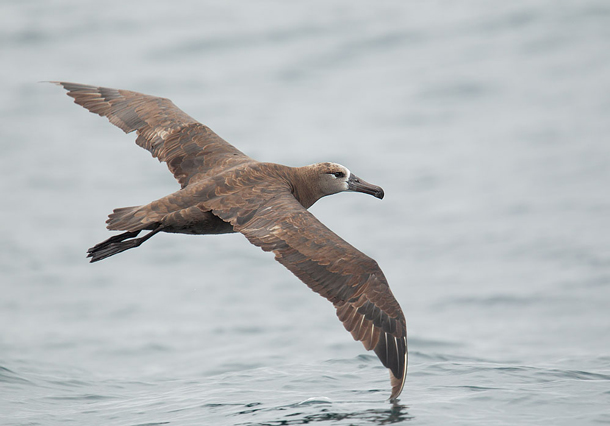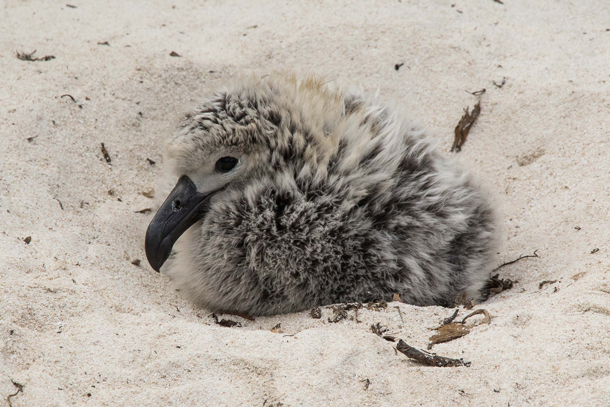BirdNote: Black-footed Albatrosses
Air Date: Week of October 6, 2017

The Black-footed Albatross uses wind currents and shifts in air pressure to fly for hours over the Pacific Ocean while barely needing to flap its wings. (Photo: Tom Grey)
Seen from land, Black-footed Albatrosses look like tiny dark dots floating above the Pacific Ocean. But, as Birdnote’s Michael Stein explains, these large, graceful, ocean-faring birds are now headed to Hawaii to raise their one huge chick, that looks for all the world like a grey fluffy cousin of Sesame Street’s Big Bird.
Transcript
CURWOOD: We head out to sea for today’s BirdNote, to catch up with some of the most magnificent of the pelagic creatures off our shores. But as Michael Stein points out, though the adults may be glorious and graceful birds, the infants are, well, downright dumpy.
BirdNote®
Black-footed Albatross, Graceful Giant
[SOUND OF WAVES AND SEA BREEZE AND CALL OF THE BLACK-FOOTED ALBATROSS]
Just a couple of dozen miles off the Pacific Coast, immense, dark birds with long, saber-shaped wings glide without effort above the wave-tops. These graceful giants are Black-footed Albatrosses, flying by the thousands near the edge of the continental shelf.
[SOUND OF WAVES AND SEA BREEZE AND CALL OF THE BLACK-FOOTED ALBATROSS]
Albatrosses arc and coast over the ocean for hours with hardly a flap of their wings. Making the most of wind currents and shifts in air pressure, these wondrous seabirds seem to levitate over the water.
[SOUND OF WAVES AND SEA BREEZE AND CALL OF THE BLACK-FOOTED ALBATROSS]
Black-footed Albatross numbers peak off the coast in summer. Many adults return to the Hawaiian Islands during our winter and spring, to court and nest on sandy islands.

Albatross parents travel hundreds of miles to collect food for their nestlings, which are raised one at a time and grow to be massive. (Photo: Eric VanderWerf, US Fish and Wildlife Service, CC)
In Hawaiian waters, the Black-footed Albatross collects squid and masses of flying-fish eggs with its long, hook-tipped bill. Adult birds may fly hundreds of miles at sea to provide food for the single, goliath nestling, which looks more than a little like a portly, gray, recumbent version of Big Bird.
[BLACK-FOOTED ALBATROSS ADULT WITH BEGGING NESTLING]
I’m Michael Stein.
###
Written by Bob Sundstrom
Sounds of the Black-footed Albatross provided by The Macaulay Library of Natural Sounds at the Cornell Lab of Ornithology, Ithaca, New York. Call of the adult and begging call of the young recorded by W.V. Ward.
Ambient track provided by Kessler Productions
Producer: John Kessler
Executive Producer: Chris Peterson
© 2005-2017 Tune In to Nature.org October 2017
Narrator: Michael Stein
http://birdnote.org/show/black-footed-albatross-graceful-giant
CURWOOD: Glide on over to our website, loe dot org for some pictures.
Links
The “Black-footed Albatross, Graceful Giant” story on the BirdNote® website
Cornell Lab of Ornithology: About the Black-footed Albatross
Living on Earth wants to hear from you!
Living on Earth
62 Calef Highway, Suite 212
Lee, NH 03861
Telephone: 617-287-4121
E-mail: comments@loe.org
Newsletter [Click here]
Donate to Living on Earth!
Living on Earth is an independent media program and relies entirely on contributions from listeners and institutions supporting public service. Please donate now to preserve an independent environmental voice.
NewsletterLiving on Earth offers a weekly delivery of the show's rundown to your mailbox. Sign up for our newsletter today!
 Sailors For The Sea: Be the change you want to sea.
Sailors For The Sea: Be the change you want to sea.
 The Grantham Foundation for the Protection of the Environment: Committed to protecting and improving the health of the global environment.
The Grantham Foundation for the Protection of the Environment: Committed to protecting and improving the health of the global environment.
 Contribute to Living on Earth and receive, as our gift to you, an archival print of one of Mark Seth Lender's extraordinary wildlife photographs. Follow the link to see Mark's current collection of photographs.
Contribute to Living on Earth and receive, as our gift to you, an archival print of one of Mark Seth Lender's extraordinary wildlife photographs. Follow the link to see Mark's current collection of photographs.
 Buy a signed copy of Mark Seth Lender's book Smeagull the Seagull & support Living on Earth
Buy a signed copy of Mark Seth Lender's book Smeagull the Seagull & support Living on Earth

